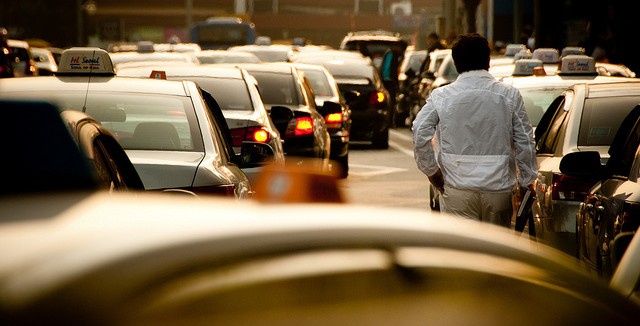The city government in Seoul, the South Korean capital, is banning Uber, a popular transportation network that uses mobile apps to connect passengers with drivers of vehicles for hire and ridesharing services. Seoul officials say local regulations on the registration and operation of taxi services make Uber's business model illegal. Uber, for its part, has not remained silent about its troubles in Seoul. The company recently warned that the city “is in danger of remaining trapped in the past and getting left behind by the global ‘sharing economy’ movement.”
The end of Uber in Seoul has provoked different reactions, both in the media and among the city's taxi-service customers.
Conservative media outlets are focusing on how Uber has hurt the local cab industry and encouraged tax evasion — two issues over which Uber and local officials have clashed in other countries. Seoul's tech community, on the other hand, has expressed fears that banning Uber might have a chilling effect on future innovations and venture projects in South Korea.
One notable exception to the largely polemical writing about Uber in Seoul is Bloter.net, a website that brings together journalists and bloggers to report on tech news. Bloter.net has probed the Uber controversy, finding that its complexities make it difficult to understand the case from a solely technological or regulatory perspective. The taxi business, Bloter.net explains, affects not just drivers and existing cab companies, but many interest groups, including municipal governments, labor unions, and of course consumers. Leaving aside concerns about tax evasion, Bloter.net asks if Uber really lives up to the promise of the “sharing economy”:
하지만 우버는 국내에서만큼은 이런 혁신성을 퇴색시켰다. 불법성을 감수하면서까지 렌터카와 대리운전 기사를 운전기사 공급망으로 끌고 들어왔고, 최근들어서는 용역업체를 통해 기사를 충원하고 있다[…]무면허 택시와 유사한 행태를 보이고 있다[…] 수많은 이해관계가 얽히고설킨 택시 경제를 위협하고 있다. 택시 경제는 ‘불친절의 상징’이지만 ‘퇴직자의 마지막 탈출구’이기도 하다 […] 임금 체계의 부조리를 담고 있어 언제 터질지 모르는 인화물질이다.
Uber's innovation, in South Korea at least, is nowhere to be found. Despite legal problems, Uber has dragged rental cars and drivers into its labor pool, and now Uber is even recruiting drivers via agencies […] Actually, the company now looks very much like an illegal taxi service. […] Uber has challenged the taxi economy, which is itself entangled in its own issues and interest groups. Taxicabs [in Korea] are infamous for their rudeness to customers, but they are also retired people's “last resort.” […] It is a wage structure built on such absurdities, a tinder box waiting to blow.
Writing on youngrok.com, a tech blogger responded to Bloter.net's article, saying the accusations against Uber are too harsh.
현재의 법과 상충하는 새로운 비즈니스가 등장했을 때 그 사회가 선택할 수 있는 방법은 두 가지다. 하나는 그냥 법을 그대로 두거나, 혹은 추가로 금지하는 법안을 만들어서 금지하는 것. 두번째는 새 비즈니스를 합법적으로 할 수 있도록 법을 고치고, 세금을 징수하는 것 […] 그러니까, 우버의 합법화 논쟁에서 답해야 하는 질문은 우버가 이 세상에 해로운 비즈니스인가? 이다[…] 지금 우버가 이렇게 고객들에게 호평을 받는 것은 그동안 택시가 워낙 개떡같았기 때문이다. 택시는 이용객들도 싫어하고, 택시를 이용하지 않는 자가용 운전자도 싫어하고, 심지어 버스 승객들까지 싫어한다. 그럼 현재 택시가 이렇게 개판이고, 그 구멍을 우버가 잘 메꿔주고 있는데도 우버를 허용하면 안되는가?
When a venture emerges and clashes with the law, there are two stances a society can take. First, it can leave regulations as they are, or pass an additional law to ban the new enterprise outright. The second option involves adjusting the law, in order to tax the venture. […] What we should be asking ourselves is, “Does Uber harm our society?” […] Korean customers have hailed Uber because the country's existing taxi service is abysmal. Customers hate it. Drivers with their own cars hate it. Even bus riders hate it. And Uber actually fills this space quite nicely. So, considering the current status of the cab system, why can't we allow Uber?
Taxi riders in Korea have been divided about Uber, too. Some say the cab service in Seoul, which has fairly wide coverage, is good as it stands. Others claim that Uber offers far better service than local cabs. Whatever people's opinions about the transportation industry, most Koreans online have been skeptical about Seoul's new plan to launch a homegrown taxi application that closely resembles Uber. For all the concern about next-generation cab services in Korea, much of the Uber scandal has promoted conversations about the country's existing taxi system.
우버는 아쉬워도 현행법에 따르는게 맞겠지만, 이를 계기로 국내 택시 환경도 바뀌면 좋겠다. 택시앱 말고 환경이. 택시 타고서 기사님 열변의 청취자가 되거나 담배냄새 나는 차에 타는 것과 좀 비싸도 예의바르고 문도 여닫아 주는 택시의 차이는 크더라.
— Suh, Dongwook (@dsuh9) July 21, 2014
It may not be satisfied with them, but Uber needs to obey Korea's current laws. Still, I hope this controversy will bring changes to the nation’s taxi environment — not only mobile apps for taxis, but the whole environment. There are lots of differences between taxis that may cost a little more, with nice drivers who open the door for you (like with Uber), and cars that reek of cigarettes with drivers who talk too much.
서울시가 우버 금지시키고 대체 앱만들겠다는 조치는 참 어이가 없다. 우버가 불법적인 요소가 있다면 금지시키는 것까지야 (논란은 있지만) 이해하겠지만 자체 콜택시 앱이라니. 담엔 에어비앤비 막고 자체 호텔앱 만들건가
— 윤필구 (@philkooyoon) July 21, 2014
Seoul's decision to ban Uber and design a replacement mobile app is just plain ridiculous. If Uber is somehow illegal, then I understand the need to ban it. But the city is now coming up with its own app? What's next? Banning Airbnb and launching its own hotel app?
http://t.co/P67JNsg4A8 내가봐도 서울시는 우버랑 싸우기보다는 택시기사들 처우개선과 서비스 개선에 힘을 쓰는게 더 나을듯한데…
— Uncle Bang (@UncleCMBang) 2014년 7월 26일
Actually, I think Seoul should focus more on improving cab drivers’ working conditions and the quality of cab service than fighting with Uber.








1 comment